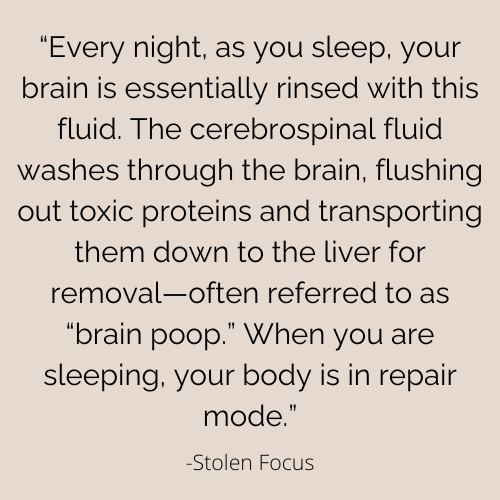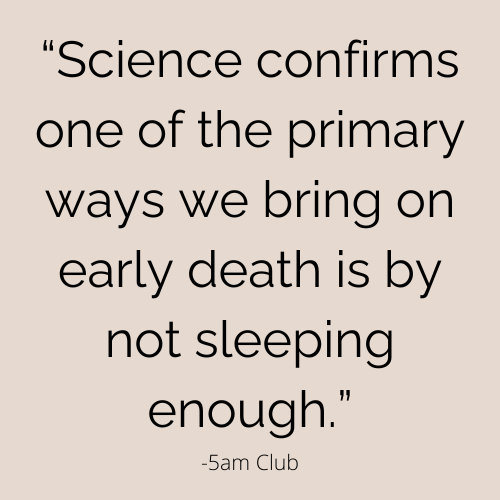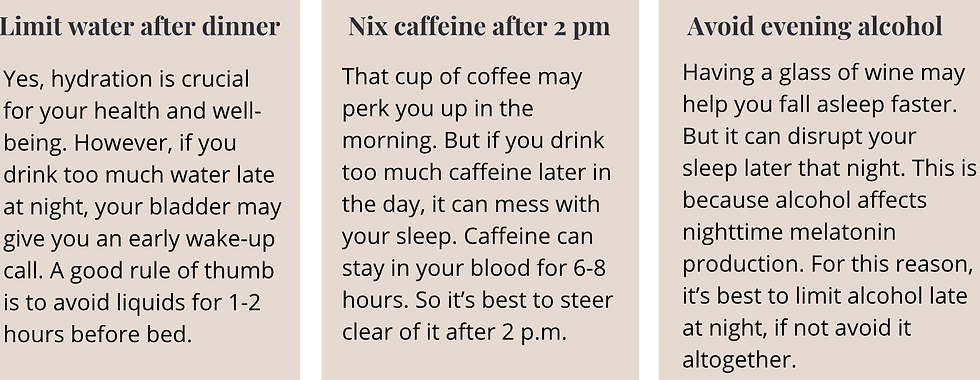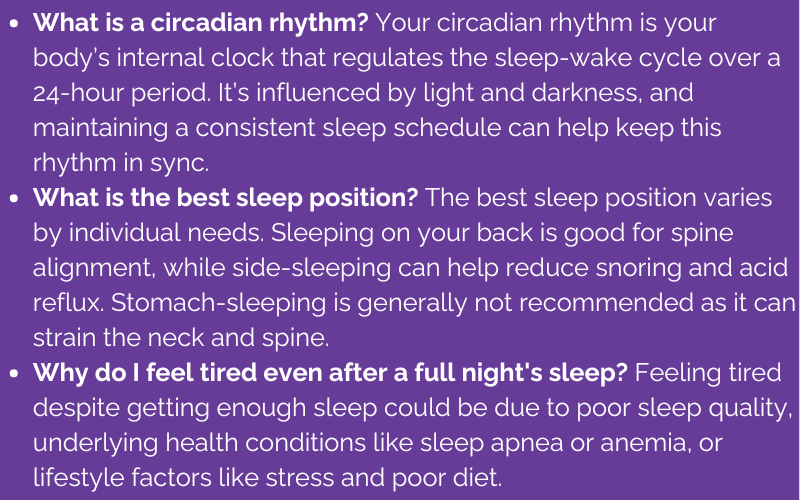
I love crawling into bed and going to sleep and I love going to bed early, waking up late, and taking long naps. While this doesn’t happen often, when it does, I’m in heaven. I also appreciate how great I feel when I consistently get 7-9 hours of sleep each night. As I’ve gotten older, I’ve made this a priority.
However, when I’m sleep-deprived, I feel the effects immediately—
physically, mentally, and emotionally. My immune system weakens, and I quickly develop mouth sores and a runny nose. It’s inevitable. If I get less than five hours of sleep, my heart races like it’s about to burst out of my chest, as if I’m stuck in fight-or-flight mode, unable to release the adrenaline.

Mentally, my focus and alertness take a hit, and my reaction time slows down. Emotionally, I’m like a teething toddler—definitely not the most fun to be around!
Sleep is one of those things we all know is important and that we need plenty of, yet as a society, across all ages and demographics, we’re heading in the wrong direction. According to Charles Czeisler, a professor at Harvard Medical School who advises everyone from the Boston Red Sox to the U.S. Secret Service, “Today, 40% of Americans are chronically sleep deprived, getting less than 7 hours of sleep each night. The amount of sleep we get has dropped 20% in the past 100 years.”
An insightful article in The New York Times, titled "On the Phone, Alone," focuses on pediatricians struggling to help adolescents. The article links smartphones and social media to sleep deprivation and the decline in mental and emotional health. It states: “Many measures of adolescent mental health began to deteriorate sometime around 2009. This is true for the number of U.S. high-school students who say they feel persistently sad or hopeless, reported loneliness, and emergency room visits for self-harm among Americans ages 10 to 19. This timing is suspicious because internet use among adolescents was also starting to soar during the same period. Apple began selling the iPhone in 2007. Facebook opened itself for general use in late 2006, and one-third of Americans were using it by 2009.”
With sleep affecting so much, it's encouraging that the topic is finally getting the attention it deserves. I’m currently reading Outlive: The Science and Art of Longevity by Peter Attia, MD, and Bill Gifford, and in this blog post, I’ll share the key insights on sleep, including how it impacts our health, the connection between chronic sleep deprivation and heart disease, metabolic dysfunction, aging, memory, Alzheimer's disease, cognitive and emotional health, and athletic performance. I’ll also close with inexpensive and simple ways to get better sleep.
How Sleep Affects Your Brain, Mental and Emotional Health and Memory
According to Roxanne Prichard, a professor of neuroscience and psychology at the University of Minneapolis, sleep is an incredibly active process. When we sleep, various activities take place in the body and brain—all of which are necessary for us to function and focus.

One of these activities is the brain’s process of cleaning itself of waste that accumulates during the day. During slow-wave sleep, the cerebrospinal fluid channels open up and remove metabolic waste from the brain. Every night, as you sleep, your brain is essentially rinsed with this fluid. The cerebrospinal fluid washes through the brain, flushing out toxic proteins and transporting them down to the liver for removal—often referred to as “brain poop.” When you are sleeping, your body is in repair mode. Sleep affects our brain in the following ways:
1.Increased Risk of Alzheimer's Disease and Dementia
Sleep plays a major role in brain health, especially as we age, not only in terms of cognitive function but also in maintaining long-term cognitive health—a crucial pillar of healthspan. Good sleep is essential for sustaining brain health, while research shows that chronic poor sleep is a significant risk factor for Alzheimer's disease and dementia.

2.Learning, Memory & Problem Solving
Both REM and NREM (deep sleep) are crucial for learning and memory. During deep sleep, the brain clears out its cache of short-term memories in the hippocampus, selecting the important ones for long-term storage in the cortex. This process helps us store and reinforce the most important memories of the day. Researchers have found a direct, linear relationship between the amount of deep sleep we get in a given night and how well we perform on memory tests the next day.
In childhood, REM sleep plays a key role in brain growth and development. While we sleep, our brain forms new connections and expands its neural network. In adulthood, REM sleep tends to plateau but remains important—particularly for creativity and problem-solving. By generating seemingly random associations between facts and memories, and by sorting out the meaningful connections from the irrelevant ones, the brain can often find solutions to problems that stumped us the previous day. REM sleep is especially valuable for procedural memory, which involves learning new ways of moving the body.

3.Our Emotional Health
REM sleep helps us process emotional memories, allowing us to separate our emotions from the memory of the negative (or positive) experience that triggered them. This is why, when we go to bed upset about something, it often seems more manageable in the morning. We retain the memory of the event but gradually forget the intensity of the emotions that accompanied it. Without this opportunity for emotional healing, we would live in a state of constant anxiety, with each memory triggering a renewed surge of the emotions tied to the event—much like PTSD.
REM sleep also helps us maintain emotional awareness. When we are deprived of REM sleep, studies have found that we struggle more with reading others' facial expressions. REM sleep appears to protect our emotional balance while aiding in the processing of memories and information.
How Sleep Affects Your Heart: Cardiovascular Health & Heart Disease
Many studies have found powerful associations between insufficient sleep (less than seven hours a night on average) and adverse health outcomes, ranging from increased susceptibility to the common cold to dying of a heart attack. The decimation of sleep is having a catastrophic impact on our health, our life expectancy, our safety, our productivity and the education of our children.
Cardiovascular & Heart Disease
Poor sleep is strongly associated with cardiovascular and heart disease. When we perceive a threat, our sympathetic nervous system takes over, mobilizing stress hormones such as cortisol and adrenaline, which raises the heart rate and blood pressure. Poor sleep has the same effect, putting the sympathetic nervous system on high alert. We get stuck in fight or flight and our heart rate and blood pressure remain elevated. This, in turn, multiplies the stress placed on our vasculature.
Two large meta-analyses have found that short sleep (less than six hours) is associated with about 6-26 percent increase in cardiovascular disease. One particular study found that sleeping less than six hours a night was associated with about 20 percent higher risk of a heart attack.
How Sleep Affects Aging, Metabolism, the Food We Eat and Athletic Performance
Sleep is as fundamental to our health as stability is fundamental to strength and science has proven that we need to sleep about seven and a half to eight and a half hours a night.
1.Aging
Studies have found that people who sleep less chronically tend to have older-looking, flabbier skin than people their same age who sleep more.
2.Metabolism
Poor sleep wreaks havoc on our metabolism. Even in the short term, sleep deprivation can cause profound insulin resistance. Sleep researcher Eve van Cauter of the University of Chicago subjected healthy young people to severely restricted sleep, just 4.5 hours a night, and found that after four days they had the elevated insulin levels of obese middle-aged diabetics and, approximately 50 percent reduction in their capacity for glucose disposal. This is a consistent finding in sleep research, which consistent findings are rare in medicine, making it clear that poor or inadequate sleep can help tilt us into metabolic dysfunction.
Poor sleep changes the way we behave around food. Studies by Eve van Cauter's group found that limiting subjects' sleep to four or five hours a night suppresses their levels of leptin, the hormone that signals to use that we are fed, while increasing levels of ghrelin, the "hunger hormone". When we sleep poorly, we can be desperately, irrationally hungry the next day, and more likely to reach for high-calorie and sugary foods. Follow-up studies by van Cauter's group found that short-sleeping subjects ate about three hundred extra calories' worth of food the following day, compared with when they were well rested. This is the perfect beginning of insulin resistance.
4.Athletic Performance
Good sleep is like a performance enhancing drug. Even a single night of bad sleep has been found to have deleterious effects on our physical and cognitive performance. Athletes who sleep poorly the night before a race or match perform markedly worse than when they are well rested. Endurance drops, VO2 max drops, and one-rep max strength drops. Even our ability to perspire is impaired. A 2014 observational study found that young athletes who slept less than six hours per night were more than two and a half times more likely to experience an injury than their peers who slept eight hours or more.
10 Ways to Sleep Better
There are many ways to improve your sleep and sleep better. None are expensive, rather they are simple, practical, inexpensive and more than anything, require the discipline to create new sleep habits.

1. Exercise, in Particular Outdoors
At least thirty minutes of outdoor exercise (strong daylight) helps keep the circadian cycle on track. (Ideally not within two to three hours before bedtime)
2.Rise, Shine & Move
You get the most benefits from sunlight right when you wake up. If possible, try to head outside within the first hour of rising, even if it’s just for a few minutes. You can take a quick walk, sip your coffee on your patio, or even eat your breakfast outside. This will also help regulate cortisol.
3.Spend Time Outside and Sync Your Circadian Rhythm
The more sunlight you see during the day, the more it syncs up your circadian rhythm. So look for activities you can do outdoors, whether that’s taking a phone call outside or eating.
4. Darken Your Room Completely & Make It Cool
Make it dark enough that you can't see your hand in front of your face. If this isn't achievable, use an eye shade. The temperature drops as the sun sets in nature. Mimicking this indoors can help support sleep. According to the Sleep Foundation, the ideal sleep temp is between 65-68 degrees Fahrenheit. But it’s more important to be comfortable than stick to a set temperature. Even dropping the thermostat a few degrees can signal your body it’s bedtime. (For the past five months I've slept with the temperature at 69 degrees and it does help!)
5. Take Natural Sleep Aid

Melatonin is a hormone that your brain produces in response to darkness. It helps with the timing of your circadian rhythms (24-hour internal clock) and with sleep. (Being exposed to light at night can block melatonin production.) Sleepytime tea is unique among teas as it contains calming ingredients such as chamomile. These ingredients can calm the nervous system and modify the neurotransmitters involved in sleep. The flowering herb has been used for centuries to facilitate sleep. Each night before going to bed, I use magnesium power from a company called Sparkle Wellness. I love it and feel like it helps.
6. Don't Drink Alcohol, but Especially Don't Drink After 6:00 p.m.
Alcohol probably impairs sleep quality more than any other factor we can control. Don't confuse the drowsiness it produces with quality sleep.
7. Don't Eat Anything Less Than Three Hours Before Bedtime
It's best to go to bed with just a little hunger
8. Prior to Bed, Take a Hot Epsom Salt Bath, Hot Shower or Sauna

When Epsom salt is dissolved in warm water, it is absorbed through the skin and increases the level of magnesium in the body. Magnesium helps produce serotonin—a mood-elevating chemical in the brain which creates a calm and relaxing sensation. Magnesium levels decrease and adrenaline levels increase. After a hot bath, massaging essential oils such as Lavender into the skin can help with relaxation. When you get into a cool bed, your lowering body temperature will signal to your brain that it's time to sleep.
9. Abstain From Stimulating Electronics, Two Hours Before Bedtime
Try to avoid anything involving a screen if you're having trouble falling asleep. If you must, use a setting that reduces blue light from your screen.TVs, smartphones, laptops, and other electronic devices emit blue light, which disrupts your circadian rhythm. For this reason, it’s best to avoid them for 1-2 hours before bed. If you must use them, consider using blue blocker glasses or download the app f.lux to reduce blue light from your computer or laptop.
10. Avoid Doing Anything Anxiety Producing or Stimulating, One Hour Before Bed
This includes text messages, work, social media, and checking email.
11.Make a To-Do List
Spending a few minutes on a to-do list, aka "brain dump" for the next day can help lighten your mind’s load before you lay down.
12.Drown Out Noise
Have a noisy pet, partner, or neighbor that’s interrupting your sleep? Turn on a fan, invest in a noise machine, or pop in some ear plugs.
13. Read a Book or Listen to a Calming Music and Sounds
Reading is a strong cognitive function that can help reduce mental chatter, which in turn, helps us drop into a quiet state of relaxation. Natural sounds relax you because they are constant noises of a pleasant pitch. Your brain interprets them as non-threatening noises, which helps reduce your fight-or-flight response. This lowers your stress level and helps you become more relaxed for sleep
14. Write in a Gratitude Journal & Give it to God

Have a gratitude journal on your nightstand and write at least 3 things you are grateful for every night before closing your eyes. Gratitude is related to having more positive thoughts, and fewer negative ones at bedtime. This, in turn, is associated with dozing off faster and sleeping longer and better. Praying and giving it to God allows you to feel comfort and a connection with God. It gives us peace as we draw closer to sleep. It can help us begin the next day feeling closer to God.
15.Relaxation & Deep Breathing
Slow, deep breaths trigger your body’s relaxation response. Here are few breathing techniques that may help your body and mind relax. Click HERE for a breathing exercise.
Diet and Lifestyle Tips to Get Better Sleep
What you eat, drink, and how you spend your waking hours can all impact your sleep. Here are some diet and lifestyle habits that’ll set you up for better sleep:

Conclusion to Getting Better Sleep
In conclusion, sleep is a powerful tool for overall well-being, with scientifically proven benefits that range from improved memory and cognitive function to a stronger immune system and emotional resilience. Prioritizing good sleep can make a significant difference in our daily lives, boosting everything from our physical health to our mental clarity. By incorporating simple tips like maintaining a consistent bedtime, creating a relaxing sleep environment, and reducing screen time before bed, we can unlock the benefits of deeper, more restorative sleep. Remember, quality sleep isn’t just a luxury—it’s a necessity for a healthier, happier life.

















Comments